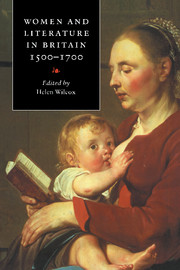Book contents
- Frontmatter
- Contents
- List of contributors
- Acknowledgements
- A note on references
- Chronology: women and literature in Britain, 1500–1700
- Introduction
- Part I CONSTRUCTING WOMEN IN EARLY MODERN BRITAIN
- Chapter 1 Humanist education and the Renaissance concept of woman
- Chapter 2 Religion and the construction of femininity
- Chapter 3 Advice for women from mothers and patriarchs
- Chapter 4 Women reading, reading women
- Chapter 5 Women/‘women’ and the stage
- Chapter 6 Feminine modes of knowing and scientific enquiry: Margaret Cavendish's poetry as case study
- Part II WRITING WOMEN IN EARLY MODERN BRITAIN
- Further reading
- Index
Chapter 5 - Women/‘women’ and the stage
Published online by Cambridge University Press: 22 September 2009
- Frontmatter
- Contents
- List of contributors
- Acknowledgements
- A note on references
- Chronology: women and literature in Britain, 1500–1700
- Introduction
- Part I CONSTRUCTING WOMEN IN EARLY MODERN BRITAIN
- Chapter 1 Humanist education and the Renaissance concept of woman
- Chapter 2 Religion and the construction of femininity
- Chapter 3 Advice for women from mothers and patriarchs
- Chapter 4 Women reading, reading women
- Chapter 5 Women/‘women’ and the stage
- Chapter 6 Feminine modes of knowing and scientific enquiry: Margaret Cavendish's poetry as case study
- Part II WRITING WOMEN IN EARLY MODERN BRITAIN
- Further reading
- Index
Summary
‘I will wear the breeches, so I will.’
(William Hawkins, Apollo Shroving 1.i. 194–8)It seems appropriate to begin this chapter on theatrical matters with a prologue – in fact two prologues – the first taken from a relatively obscure play, William Hawkins's Apollo Shroving, an example of the academic drama written for scholars at Hadleigh School, Suffolk, and performed by them on Shrove Tuesday, 6 February 1626. In what Hawkins calls the ‘Introduction’, the male speaker of the prologue is interrupted by a female spectator called Lala (addressed as ‘Mistress Lala, Spinster’, or ‘Dame Lall’) who objects to his use of Latin words and classical names, fearing that she will not be able to follow the play if it is in Latin. At the end of the first scene she leaves, somewhat mollified, with this exit speech:
Well, I see now it will be English. It shall go hard but I'll get a part amongst them. I'll into the tiring house, and scamble and wrangle for a man's part. Why should not women act men, as well as boys act women? I will wear the breeches, so I will.
(1.i.194—8)- Type
- Chapter
- Information
- Women and Literature in Britain, 1500–1700 , pp. 100 - 116Publisher: Cambridge University PressPrint publication year: 1996
- 3
- Cited by

